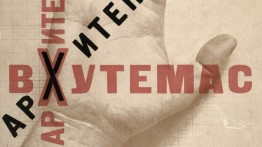Typography at VKhuTeMas, the Soviet Union’s Revolutionary Art School
Monday, November 14, 2022, 6:30 - 8:30pm

VKhuTeMas, or Higher Art and Technical Studios, is a revolutionary Soviet art school that opened its doors just a year after the founding of Bauhaus in Germany. Today, the school is usually remembered for a slew of avant-garde artists who worked there — Kandinsky and Malevich, Rodchenko and Stepanova, Lissitzky, and Tatlin, among many others. However, the school’s innovative pedagogy and its democratic admission structure geared towards working class students deserve attention as well. Following some of the formal, theoretical, and political debates that happened in and around VKhuTeMas allows us to better understand the ground-breaking use of typography that developed there and became a staple of constructivist art and design. This lecture will shed light on the origins and trajectory of VKhuTeMas, paying especially close attention to how ideas on typography fed into the school’s artistic output and how they evolved over time.
A discussion following the presentation will also include Anna Bokov, the author of Avant-Garde as Method: Vkhutemas and the Pedagogy of Space, 1920–1930 (Park Books, 2020) and a faculty member of The Irwin S. Chanin School of Architecture at The Cooper Union.
The lecture is co-sponsored by The Irwin S. Chanin School of Architecture at The Cooper Union.
Polina Godz is an art director at the Tribune magazine, and a graphic designer at the Jacobin magazine. She holds a BFA in Graphic Design from the Rhode Island School of Design, and a BA in Modern Culture and Media from Brown University. She was a part of the Type@Cooper Extended program in 2020–21 and is still working on a few projects started then. She is originally from Kharkiv, Ukraine.




